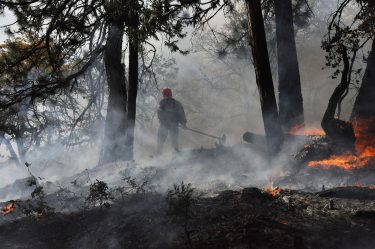
As the natural world responds to climate change, American Indian tribes across the country are grappling with how to plan for a future that balances inevitable change with protecting the resources vital to their cultural traditions.
The University of Washington Climate Impacts Group and regional tribal partners have developed a collection of resources that may be useful to tribes at any stage in the process of evaluating their vulnerability to climate change. The project is a partnership among tribes, tribal associations, universities and the federal government.
“This work really is to support tribes’ leadership in climate adaptation, and the goal is to make it easier for every tribe that wants to complete the process,” said Meade Krosby, a research scientist at Climate Impacts Group and the project lead. “This is a way to support the tribes that are leading the way, but also to make sure those that are having a harder time getting started have the resources to begin.”
Read more at UW Today »
